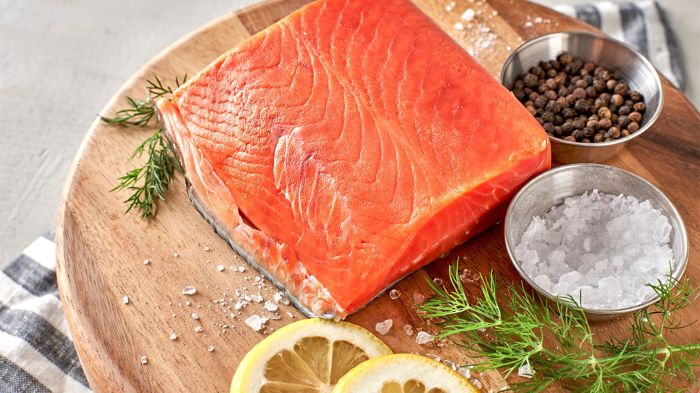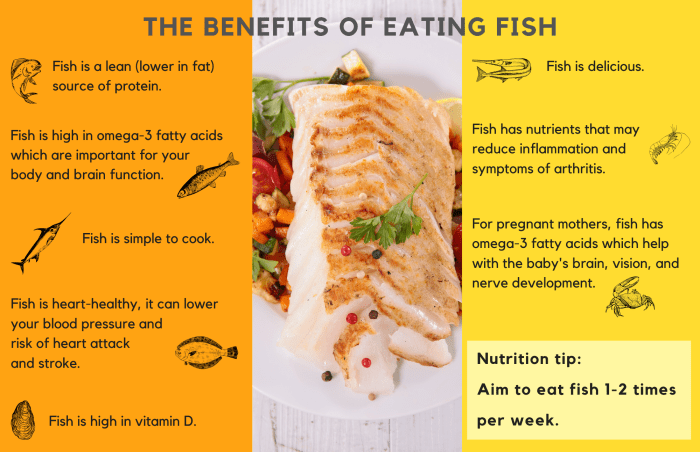Fish only diet – Embark on a culinary adventure with the fish-only diet, an intriguing nutritional approach that centers around the exclusive consumption of fish. Discover its potential benefits and risks, delve into its environmental impact, and explore practical considerations to guide your journey towards optimal well-being.
From heart health to cognitive function, we unravel the potential health implications of this unique dietary choice. We also shed light on concerns such as mercury exposure and nutrient deficiencies, ensuring you make informed decisions about your dietary path.
Nutritional Considerations
A fish-only diet is a restrictive eating pattern that limits consumption to fish and seafood, excluding all other food groups. This approach has gained popularity among some individuals seeking a high-protein, low-carbohydrate diet.
From a nutritional standpoint, fish offers an abundance of essential nutrients, including:
- Protein:Fish is a complete protein source, providing all the essential amino acids required for bodily functions.
- Omega-3 fatty acids:Fatty fish, such as salmon, tuna, and mackerel, are rich in omega-3 fatty acids, which play a crucial role in heart and brain health.
- Vitamins and minerals:Fish contains various vitamins and minerals, including vitamin D, vitamin B12, iodine, and selenium.
Potential Benefits
Adhering to a fish-only diet may offer certain benefits, such as:
- Reduced risk of heart disease:The omega-3 fatty acids in fish have been associated with a lower risk of heart disease.
- Improved brain function:Omega-3 fatty acids are essential for brain development and cognitive function.
- Weight management:Fish is a lean protein source that can promote satiety and support weight loss efforts.
Potential Risks
Despite its potential benefits, a fish-only diet also carries certain risks:
- Nutrient deficiencies:Restricting intake to only fish may result in deficiencies in essential nutrients such as carbohydrates, fiber, calcium, and vitamin C.
- Mercury contamination:Some fish, such as tuna and swordfish, can contain high levels of mercury, which can be harmful to health.
- Environmental concerns:Overfishing and unsustainable fishing practices pose threats to marine ecosystems.
It’s important to note that a fish-only diet is not recommended for long-term adherence. A balanced and varied diet that includes a wide range of food groups is essential for overall health and well-being.
If you’re looking to make a gradual transition to a plant-based diet, going pescatarian is a great option. This approach allows you to enjoy the health benefits of seafood while reducing your meat consumption. By incorporating more fish and seafood into your meals, you can boost your intake of omega-3 fatty acids, protein, and essential vitamins.
Health Implications
Adopting a fish-only diet can have profound health implications, both beneficial and detrimental. Understanding these potential effects is crucial before making an informed decision about embracing such a dietary regimen.
On the positive side, a fish-only diet may reduce the risk of cardiovascular disease and improve cognitive function due to the high levels of omega-3 fatty acids found in fish. Omega-3 fatty acids have anti-inflammatory properties that can help lower blood pressure, reduce triglycerides, and improve cholesterol levels.
Mercury Exposure
However, one potential health risk associated with a fish-only diet is mercury exposure. Fish can accumulate mercury from their environment, and consuming large amounts of fish can lead to mercury poisoning. Symptoms of mercury poisoning include neurological problems, kidney damage, and reproductive issues.
Vitamin B12 Deficiency
Another potential health risk is vitamin B12 deficiency. Vitamin B12 is essential for red blood cell production and neurological function. Fish do not contain vitamin B12, so people on a fish-only diet must obtain this vitamin from other sources, such as fortified foods or supplements.
Case Studies and Research Findings
Several case studies and research findings have supported the health implications of a fish-only diet. For example, a study published in the journal “Neurology” found that people who consumed fish regularly had a lower risk of developing Alzheimer’s disease.
Another study published in the journal “The American Journal of Clinical Nutrition” found that people who followed a fish-only diet had lower levels of LDL (bad) cholesterol and higher levels of HDL (good) cholesterol.
Environmental Impact

A fish-only diet can have a significant environmental impact due to the sustainability of fish populations and the potential for overfishing. The demand for fish has increased drastically in recent years, leading to overfishing and the depletion of fish stocks.
Overfishing occurs when fish are harvested at a rate faster than they can reproduce, resulting in a decline in fish populations and disruption of marine ecosystems. This can have cascading effects on other species that rely on fish for food or habitat.
Ethical Considerations, Fish only diet
Consuming large amounts of fish raises ethical concerns related to the well-being of fish and the impact on marine ecosystems. Some fish species experience pain and distress during the fishing process, and bycatch, the unintentional capture of non-target species, can lead to the deaths of millions of marine animals each year.
Embarking on a journey going pescatarian can be an exciting and rewarding experience. This dietary shift involves abstaining from meat while incorporating more fish and seafood into your meals. It’s a great way to reduce your environmental impact, improve your health, and expand your culinary horizons.
Sustainable Fishing Practices
To mitigate the environmental impact of a fish-only diet, it is essential to adopt sustainable fishing practices that prioritize the conservation of fish populations and marine ecosystems.
- Selective Fishing:Using fishing gear that targets specific species and minimizes bycatch.
- Marine Protected Areas:Establishing areas where fishing is restricted or prohibited to allow fish populations to recover.
- Aquaculture:Farming fish in controlled environments to reduce pressure on wild fish stocks.
- Sustainable Seafood Certification:Supporting fisheries that meet environmental and social standards.
Practical Considerations: Fish Only Diet

Adhering to a fish-only diet necessitates careful planning and preparation to ensure nutritional adequacy. This section provides a sample meal plan, nutritional data for various fish types, and a cost-availability comparison to guide individuals in implementing this dietary approach.
A well-balanced fish-only diet should incorporate a variety of fish species to meet the body’s nutritional needs. Different types of fish offer varying amounts of essential nutrients, such as omega-3 fatty acids, protein, vitamins, and minerals.
Sample Meal Plan
Here’s a sample meal plan that meets the nutritional requirements of a fish-only diet:
- Breakfast:Grilled salmon with scrambled eggs and whole-wheat toast
- Lunch:Tuna salad sandwich on whole-grain bread with mixed greens
- Dinner:Baked tilapia with roasted vegetables and brown rice
- Snacks:Apple with peanut butter, Greek yogurt with berries
Nutritional Content of Different Fish Types
The nutritional content of fish varies depending on the species, cooking method, and portion size. Here’s a table summarizing the nutritional information for some commonly consumed fish:
| Fish Type | Calories | Protein (g) | Omega-3 Fatty Acids (g) |
|---|---|---|---|
| Salmon | 200 | 25 | 2 |
| Tuna | 180 | 28 | 1.5 |
| Tilapia | 120 | 20 | 0.5 |
| Cod | 150 | 26 | 1 |
| Herring | 200 | 20 | 3 |
Cost and Availability of Different Fish Types
The cost and availability of fish can vary depending on factors such as the region, season, and type of fish. Here’s a table comparing the approximate cost and availability of different fish types:
| Fish Type | Cost per Pound | Availability |
|---|---|---|
| Salmon | $10-$15 | Widely available |
| Tuna | $5-$10 | Widely available |
| Tilapia | $4-$8 | Widely available |
| Cod | $6-$12 | Moderately available |
| Herring | $3-$6 | Moderately available |
Final Thoughts

As we conclude our exploration of the fish-only diet, it is evident that it presents both opportunities and challenges. While it offers potential health benefits, environmental concerns and practical considerations must be carefully weighed. Ultimately, the decision to adopt this dietary approach should be made in consultation with healthcare professionals and informed by personal values and circumstances.
Clarifying Questions
Is a fish-only diet nutritionally adequate?
While fish provides essential nutrients, a fish-only diet may lack certain vitamins, minerals, and fiber found in other food groups.
What are the environmental concerns associated with a fish-only diet?
Overfishing and the depletion of fish populations are key environmental concerns, highlighting the importance of sustainable fishing practices.
Can a fish-only diet improve heart health?
Research suggests that the omega-3 fatty acids found in fish may contribute to reduced risk of cardiovascular disease.